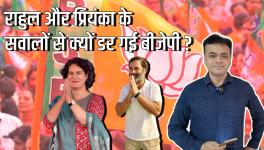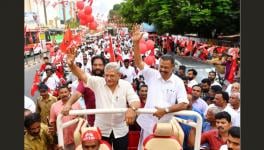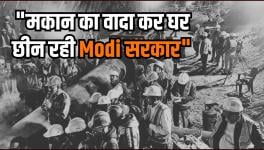Why Hindutva Wants to woo Christians

Image Courtesy: PickPik
On 25 December, Prime Minister Narendra Modi invited many Christians for an interaction and to greet them. He lauded the community for their social work and hailed the inclusive teachings of Christ. He also recalled his long association with the community leaders. Nearly two hundred Christians joined the Bharatiya Janata Party (BJP) in Kerala a few days later. The Hindu newspaper reports, “A meeting of the BJP State leadership in Kottayam here on Monday decided to launch a ten-day-long Sneha Yathra, which seeks to win over the community by explaining its position on various issues, including the Manipur violence.” At the same time, Kerala Chief Minister Pinarayi Vijayan was on the dot in stating, “Things have reached such a pass in Manipur that a segment of people… Christian community cannot live. There was no government intervention. Now, we have noticed [the] intervention of certain persons who were not willing to stop the genocide. For votes, certain people are ready to wear disguises. Everyone can understand the motive behind this attempt to pretend friendship.”
As the 2024 general election approaches, the Rashtriya Swayamsevak Sangh (RSS) and BJP have activated their attempts to woo the Christian community. The present conditions of the Christian community are reflected in various international reports and indices of religious freedom. Two incidents of persecution reportedly occur daily. The problem is not limited to Manipur. In Uttar Pradesh, according to recent reports, “100 pastors and even ordinary men and women are in jail under charges of illegal conversions when all they were doing was celebrating birthdays or conducting Sunday prayers.”
As per the United Christian Forum, 302 attacks took place against Christians in the first seven months of 2022. A petition filed by Archbishop Peter Machado of the Bangalore Diocese, the National Solidarity Forum and the Evangelical Fellowship of India states that the “state has failed to take immediate and necessary action against groups that have caused widespread violence and used hate speech against the Christian community, including attacks at their places of worship and disruption of prayer meetings.”
For four consecutive years, the United States Commission on International Religious Freedom declared India a country of particular concern.
As per Open Doors International, “Since the current government came to power in May 2014, pressure on Christians has risen dramatically… Hindu extremists attack others with impunity, using extreme violence in some areas… Increasing numbers of states are also implementing anti-conversion laws, supposedly to stop Hindus from being forcibly converted to other religions, but in reality, they are often used as an excuse to harass and intimidate Christians.”
The present condition of the Christian community is rooted in the Hindu nationalist discourse, where Islam and Christianity are regarded as foreign religions. The RSS’s second Sarsanghchalak, MS Golwalkar, in his book, Bunch of Thoughts, wrote that the Muslims, Christians and communists are internal threats to the Hindu nation. RSS propaganda on these lines is conducted in its Shakhas or branches. The anti-Christian violence began in the Adivasi, based on the propaganda that Christian missionaries were converting people through force, fraud and allurement.
Historical accounts of Christianity say its journey in India began in AD 52 with St Thomas arriving on the Malabar coast and setting up a church. Other accounts date the arrival of Christianity to the 4th Century AD. As per the 2011 Census, the percentage of Christians in India is 2.3%. Interestingly, this is a constant drop since 1971, when the Christians were 2.60% (1911: 2.30%, 1981: 2.44%, 1991: 2.34%, 2001: 2.30%).
Yet the constant propaganda to the contrary has led to a rise in anti-Christian violence, such as in the Dangs region of Gujarat from 25 December 1998 to 3 January 1999). Then followed the dreadful burning alive of Pastor Graham Stains, an Australian missionary working in Odisha, on the night of 22 January 1999 by Hindutva outfit Bajrang Dal activist Rajendra Pal, a.k.a. Dara Singh and his accomplice Mahender Hembram, who are currently serving life sentences. The killings were described by then President of India, Dr KR Narayanan, as belonging to the “world’s inventory of black deeds”.
The Wadhwa Commission formed in the aftermath of the Staines’ killings concluded that he was not involved in conversions and that there was no increase in the population of Christians in the area where he worked. Anti-Christian violence still erupts in remote areas, often around Christmas time.
Anti-Christian violence is a low-radar activity where the priests working in remote areas are apprehended, often when conducting prayer meetings. The Bajrang Dal and its allies obstruct these meetings, and many priests are arrested and harassed.
It is in this context that many are viewing the prolonged violence in Manipur. The Kukis, who are predominantly Christians, have become refugees in their own state despite the double-engine government, i.e., the same party ruling Manipur and Delhi. The Prime Minister has remained silent on the violence, leaving social activists and brave journalists to visit the area and report on events. But deep cleavages, as in Manipur, cannot be repaired if the government remains apathetic.
Meanwhile, the present government primarily focuses on image-building activities aimed at electoral gains by consolidating Hindu voters. In Kerala, many affluent Christians are being lured by Hindu majoritarian politics. Indeed, some of the top religious leadership is also tempted to associate with the regime to save itself from raiding parties of the central agencies.
Seen in this light, the outreach to Christians by the ruling party would appear like a strategy: the same outfits that have marginalised the Christian community now want to use them for electoral gains.
Get the latest reports & analysis with people's perspective on Protests, movements & deep analytical videos, discussions of the current affairs in your Telegram app. Subscribe to NewsClick's Telegram channel & get Real-Time updates on stories, as they get published on our website.























